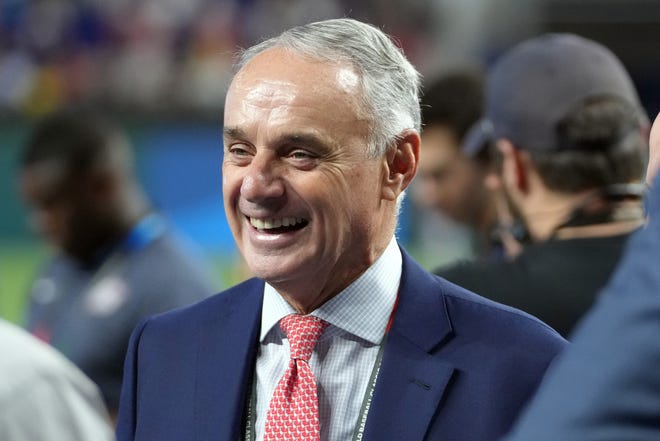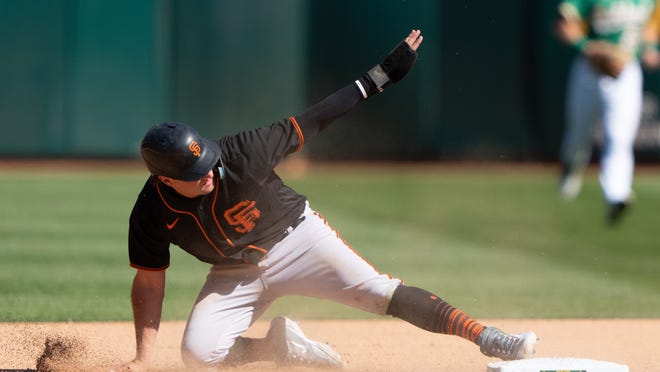[ad_1]
HOUSTON — The Houston Astros will unveil their World Series championship banner Thursday evening above the train tracks at Minute Maid Park in front of a frenzied crowd against the Chicago White Sox.
Aaron Judge will take the field at Yankee Stadium as the franchise’s single-season home run king, facing the team that nearly signed him as a free agent, the San Francisco Giants.
Max Scherzer will step on the mound for the New York Mets against the Miami Marlins, reunited once again with fellow Cy Young winner Justin Verlander.
Happy opening day!
This is the only time all 30 teams will be undefeated, before reality starts to separate itself from fantasy.
MLB 2023: Five most important players for the new season
100 NAMES TO KNOW: Young players primed to make an impact in 2023
Why, after three years of COVID-19 restrictions and a work stoppage, normalcy has never felt so good.
“I think this could go down as one of the most unbelievable opening days in history when you think about it,’’ MLB Commissioner Rob Manfred told USA TODAY Sports last week in a wide-ranging interview in Miami.
“We’re back to normal. We got the most exciting set of rule changes I think ever in the game, really, certainly the biggest set. … I think we have great momentum coming into this year.’’

Baseball is poised once again to become America’s favorite pastime – well, at least until NFL season.
“Look, I think that the moniker of America’s pastime belongs to our name,’’ Manfred said, “and it doesn’t really have to do with whether our ratings are the same as some other sport or not. Our game occupies a unique place in American culture. I think the metrics surrounding our game are really strong.
“Our attendance again has rebounded post-pandemic in a way that we think we’re going to be back at levels this year that reflect a very healthy level of interest in the sport.
“I feel confident about our future.’’
Impact of rule changes
The sweeping new rule changes will dominate discourse in the early going with baseball implementing a pitch clock for the first time in history, banning infield shifts and using enlarged bases.
The pitch clock has already created a mixture of anger, frustration and comedy during spring training, highlighted by Philadelphia Phillies catcher J.T. Realmuto’s ejection on Monday after an awkward ball exchange with home plate umpire Randy Rosenberg.
Realmuto insisted he innocently turned his glove away when receiving a baseball, with Rosenberg believing it was a stall tactic.
“First time I was ejected,’’ Realmuto told reporters. “It was a soft way to get thrown out.”
It was funny in spring training – but what happens if it occurs during the regular season?
MLB sent out rule clarifications five times during the spring, trying to resolve any confusion and correct glitches. But despite several star players openly campaigning for an extra five seconds on the pitch clock – currently 15 seconds with no one on base and 20 seconds with a runner on – the timer remains unchanged. It will stay the same throughout the season, and the postseason, too.
Well, at least for now.
Manfred met with eights teams in spring training, will visit the Philadelphia Phillies and Texas Rangers on opening day and plans to meet with every team to keep open a dialogue. Still, despite some grumbling, players seemed to have adopted quite nicely, with just 1.30 pitch timer violations per game this spring.
“I’ve had a very positive dialogue about, you know, adjustments that we might consider,’’ Manfred said. “They’ve been thoughtful that none of them relate to no clock. It’s small things that we need to adjust based on particular game situations, which we’re obviously open to. That kind of player input is really important to us and does influence us in terms of how we should proceed.”
Could there be any adjustment made for the postseason after watching the drama unfold in the WBC where players took their time, needing a few extra seconds to regain their composure, and letting the momentum build?
“We’re cognizant of the high-leverage situation late in regular-season games and postseason games,’’ Manfred said, “and it’s something we’ll keep an eye on going forward.
“I will tell you, the overwhelming reaction to the WBC in relation to the pitch clock, from people that have reached out to me is, ‘Why didn’t you use it?’ These games look bad in comparison to what’s happening in pitch-clock games.”
‘Hats off to the players’
The average game time in spring training was 2 hours, 35 minutes, nearly a half-hour quicker than last year’s lockout-shortened spring games. The real test will begin Thursday with regular-season games. The last time major league games averaged 2:35 or less was in 1982. MLB’s goal is for the games to average 2 hours, 45 minutes, which is 21 minutes quicker than last year’s regular season.
“I am pleased,’’ Manfred said, “the results, the quantitative results, the feel of the game, the way the games are moving, I think it’s been A-plus. Hats off to the players.’’
MLB still is exploring the possibility of an automated strike zone, but it likely wouldn’t be implanted before 2025, allowing players and teams to first digest these new rules.
“I have been internally an advocate of we did a lot this year, we need to let it settle and figure out exactly where we are,’’ Manfred said. “On the other hand, the purpose of the new competition committee is to have an ongoing dialogue about what should be done with the game – and that dialogue happened more real time – so I kind of got things going in two different directions there.
“I just think we’ll have to see how the season unfolds.’’
Certainly, business is booming again in baseball, surviving three tumultuous years with the pandemic shutdown, restrictions and a lockout. Revenue generated nearly $11 billion last year, and season ticket sales have returned to pre-COVID-19 levels.
“We feel very encouraged by the recovery that took place in ’21 and ’22,’’ Manfred said. “Once we got past (the) labor (stoppage), our business really continued to escalate throughout the season. We had attendance numbers in September we hadn’t seen since 2014. A lot of that was (the expanded) playoff format, more teams in the hunt, and more fans going to the ballpark.”
‘The perception of competition’
Certainly, the Diamond Sports bankruptcy involving the Bally regional sports networks is quite concerning, if not alarming. Owners wonder if they’ll get paid by their TV partners, and fans worry about being able to watch their teams.
Yet, Manfred re-assured that all of the baseball games will still be televised, no matter what channel.
“I think the most important thing for fans to understand is that we feel confident no matter what tack Bally takes,’’ Manfred said, “Those games will be available for fans to watch in their local markets. I feel very confident in saying that.
“And exactly how that’s going to unfold, unfortunately, is a product of decisions that Bally has to make more than anyone else. But whatever they decide to do, we think we’re prepared for it and are prepared to step in if there’s a problem to make sure our fans get their games.’’
The biggest change Manfred and owners would like to see is a severe reduction in payroll disparity, which is now the largest in baseball history.
“I think of it in terms of competitiveness, right?’’ Manfred said. “I mean, our product is a simple product. We sell competition, that’s what we sell. And I think that for owners, it’s not so much the ‘I can only spend $70 (million) and somebody spending $320. But it is the perception that’s created by that disparity that, ‘My team somehow doesn’t have a chance’ at the beginning of the year.”
Certainly, the Tampa Bay Rays and Cleveland Guardians have defied the theory that small-payroll teams can’t win, with each team getting to the World Series in the last seven years. Yet the Cleveland franchise has gone 75 years without winning it all, and the Rays have never won the World Series.
“Look, that’s why I shied away from the idea that it’s just raw payroll disparity,’’ Manfred said. “It is the overall perception of competition across the league that is an important issue.’’
Expansion is coming, along with massive realignment, but first, baseball needs to find new ballparks for the A’s and Rays, even if it means the A’s relocating to Las Vegas.
“I’ve said this over and over again,’’ Manfred said, “Tampa and Oakland need to get resolved. I am more optimistic that those issues will get resolved, and I actually hope within the calendar ’23.
“I think that getting them resolved, allowing the industry to digest what’s happened there, you still need a couple of years to have a thoughtful debate about what should happen from a expansion perspective.’’
In the meantime, Manfred is enthused about this year, believing it could be the most compelling season since he took over the job from Bud Selig nine years ago.
New rules. New faces.
And a balanced schedule in which every team plays each other.
“I think it’s a great improvement for us, I really do,’’ Manfred said. “I think the combination of a variety of things, the significance of the RSNs, the schedule we were playing, probably contributed to the game becoming more local than is healthy for us.
“We need to be a more national product. And I think that balance schedule is an important piece of the puzzle.’’
It all starts Thursday, the first time since 1968 that every team is scheduled to play on opening day..
“Opening day is one of my favorite days of the year,’’ Manfred said. “It’s a little different in this job. I am really excited to get going this year. I think we have great momentum coming into this year, and when you have that feeling, you want to get out of the gate, and you want to get going.
“I think it’s going to be very exciting for our fans.’’
Play ball.
Follow Nightengale on Twitter: @Bnightengale
[ad_2]
Source link






